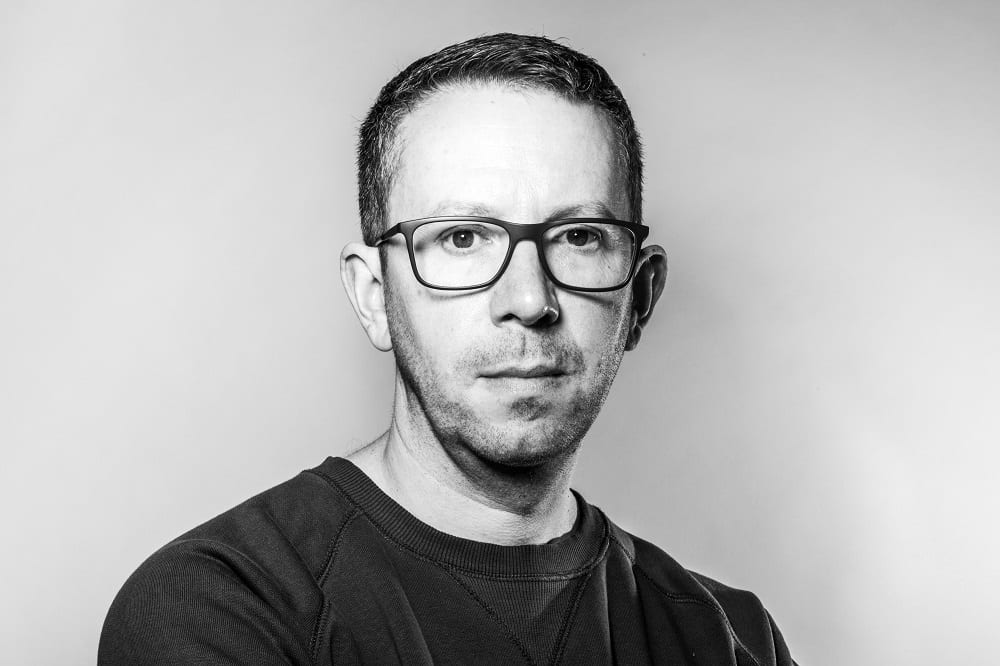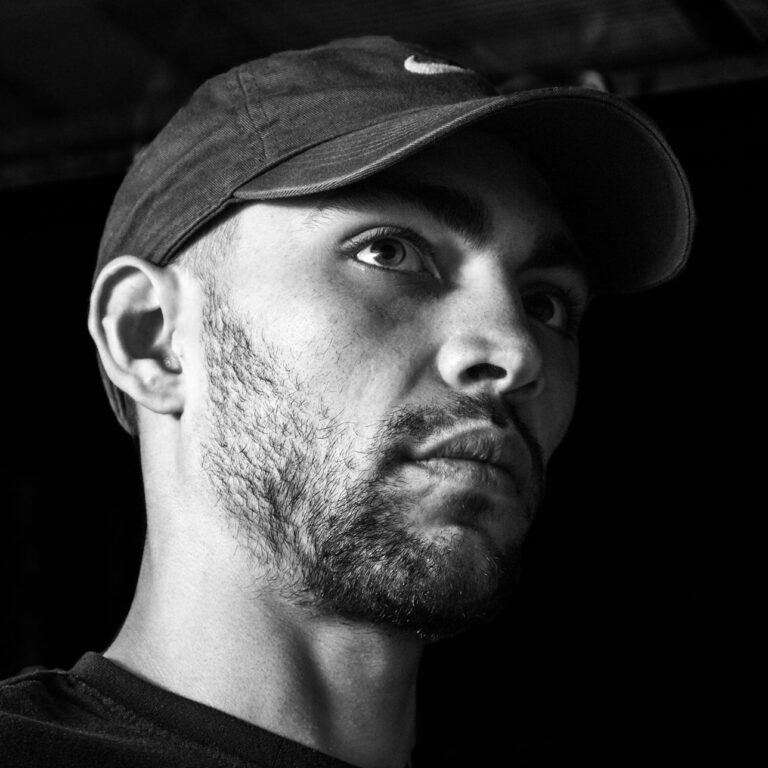Photography: Gary Jones
Six years is a long time to wait for anything, but the wait for Nu:Tone’s sixth solo album Little Spaces has felt especially long for those who have been following the producer’s journey since signing to Hospital back in 2004. But as the saying goes, good things come to those who wait, and Little Spaces is certainly worth it.
Reflective of the way Nu:Tone’s musical direction has been changing of late, it’s an album filled with stripped-back, intimate drum and bass productions designed to be heard in little spaces. A vision ironically brought to life by the pandemic and the way home listening has become the only way many of us can consume music right now.
From using real instruments to utilising old production processes, Little Spaces is an album built with a natural, organic approach. One straying from overproduced synths and overcomplicated arrangements in favour of allowing the natural beauty of music to shine through. We’ve always known Nu:Tone as a producer who pays particular attention to the little details, but it’s fair to say Little Spaces is some of his most considerate work to date. Expect the usual soulfulness, but with even more delicacy.
UKF caught up with Nu:Tone to have a chat about his sixth solo album and find out why we have had to wait so long for it.
Little Spaces is out! How come it has been six years since your last solo album?
It doesn’t feel like it has been that long… I guess there was the last Nu:Logic album in 2017, which wasn’t that long after my last solo album Future History, then I’ve also been busy with my A&R work for Hospital, alongside running a mastering business. Also, I just didn’t feel like I had anything to say musically. I’ve never been a fan of forcing it. There was a period where there wasn’t anything exciting me when I was in the studio, so I decided to hold fire until I knew what I wanted to do, and that’s Little Spaces.
It’s important for music to come naturally like this, instead of forcing yourself to write an album for the sake of filling a gap.
Definitely. I think everybody goes through phases where they lack creativity. I’ve been doing music for a while now and have confidence in my mindset and skills, but in the past when I’ve had writer’s block it has freaked me out. These days, I just roll with it and find other ways to keep myself busy.
Your mastering business seems to be keeping you particularly busy. In some ways, I imagine it has sparked inspiration for your own productions.
It can go both ways… One is that it can be quite depressing sitting down with amazingly produced tunes by other people, thinking – I wish I’d made that, haha. But the flip side is as you say, it can be inspiring. It’s also a good way of keeping my ear to the ground in terms of keeping up with the new artists coming through for the A&R side of things.
How has you’re A&R role with Hospital been going? You’ve been doing it for a few years now.
I find it fulfilling. It’s a nice way to use my skills and experience to help other artists. Rather than scouting for new talent, the majority of my work revolves around working with existing artists, helping them with their releases. I’ve been able to share my insight on areas such as production, arrangement and vocals.
That’s cool. So when did your attention turn to your own album?
During the second half of 2019 I began having lots of ideas. Sketches were turning into full tunes, and I started getting to the stage where I was ready to approach vocalists. It felt like it was turning into an album.
So it was a very natural process?
Yeah. I’m not the type of producer to sketch out a plan, write, record and release. It tends to be more of an experimental phase. And then when that starts to make sense to me I can begin moving into the album phase.
I hear there’s an interesting story behind the album idea…
I basically had this dream where I was holding an album with the title Little Spaces. I really liked the name. When I started to think about the title it became more relevant– certainly in terms of the direction everything was moving for me musically, which was more on the intimate side. Soulfulness has always a big part of my music, but stripped-back, delicate, intimate D&B centred around the idea of little spaces made sense to me. This was all prior to Covid, but once lockdown kicked in I realised people would be listening to the album in little spaces.
That’s true. People will be listening to your album at home, in the car, at work.
I think music like this is designed for little spaces anyway. Hopefully it also works well on a big system. I sometimes feel like the intense, powerful tracks don’t translate well to a small space. That has always been a big factor for me. Tunes with simple, relaxed mixdowns sound lovely during home listening, but when you scale them up to clubs they actually have a lot of impact because there’s a big dynamic range.
So from the outset, would you say you had a clear goal for this project?
I felt pretty certain of what I wanted to do. Sometimes, writing an album can feel like flailing around in the dark, whereas with Little Spaces I had a clear vision. The big thing for me has been focusing on what I want to do and not looking around too much. In the past, I’ve asked myself – who’s going to support this? Is it going to get on the radio? But now all I care about asking myself is whether I want to have it in my catalogue or not. It doesn’t matter if someone is already doing it or if no one has done it. All that matters is how it makes me feel.
That approach comes across in the album. I get the impression you’ve been able to really drive your influences into it.
Especially some of the throwbacks that are like stripped back, soulful rollers. Some of those tunes, like Shift Break, are reminiscent of early Soul:R and Mist:i:cal releases. Those tunes were a huge influence on my sound. I don’t feel like there are many people making that sound anymore, but it’s important. It’s just drums, bass and well-chosen sounds. It’s not about crazy sound design, it’s just nice elements working together.
I imagine it’s easy to get caught up on sound design thinking you need to create new, innovative soundscapes, but the natural approach is a fruitful one.
It’s a really big thing for me. I have no end of synths that could make crazy sounds, but most of the time that’s not what I reach for. Before I was into production I listened to jazz and rare groove soundtracks. One of the things that always interested me about them, especially ‘70s soundtracks, were the unusual combinations of acoustic instruments. Composers like Lalo Schifrin and Quincy Jones would put together two instruments you’d never usually combine. Those combinations give you an entirely new sound.
Any particular examples?
Just little things like an arpeggio in the intro of a tune that has a celeste, which is a tiny piano similar to a glockenspiel. You put that together with a harp and you have something that is plucking and chiming. When you hear them at the same time you can’t easily distinguish between them. What you end up with is analogue sound design with combos creating a unique vibe. It’s a way of putting music together to give you the feel you’re after, without wrenching your eardrums… I tend to go for warmer sounds anyway, so that approach suits my vision.
That natural musicality come across well. I particularly like the simple but effective progression of Can’t Stop, Won’t Stop.
That one is probably the most synthetic tune on the album funnily enough, but at the same time loads of the elements run through an old tape emulator, which emulates the sound of old cassettes. It gives everything a slightly woozy, gentle pitch modulation, which takes me back to my earliest recording experiences with four track tape recorders that never held their pitch… You’re right though, Can’t Stop, Won’t Stop is all about the progression and the way the arrangement builds. This is what interests me as a producer.
Speaking of early influences, Jonas is a track full of them. There are some crazy jungle breaks in it!
It’s a bit of a Bristol throwback! That sound was so important to me growing up. It got me into D&B in the first place with tunes sampling rare groove and jazz. I love the contrast of intros with beautiful, funky, soulful elements switching into jungle madness.
It’s important to hark back to those early influences and show appreciation for the roots.
Absolutely. It’s funny because Future History was all about that – looking back at the things that got me into D&B, trying to find new context for those ideas. It’s funny to see how much of a resurgence the jungle sound has had over the past five years. I sometimes wonder if Future History might have worked better a few years later… But It’s nice to do something when others aren’t doing it.
Definitely. I especially love the breakdown of Jonas. The sample is awesomely creepy…
It’s weird… I wasn’t sure if I should get rid of it, but I’m glad I didn’t. It’s taken from an old radio play from 70 years ago. It’s a snippet at the end of this play about the Beast of Bodmin Moor. From what I gather, it’s about a person who has driven their car off the road after going crazy, and the woman really doesn’t care. I found it funny that someone commented on the Youtube upload saying it was one of the most British things they’d ever heard… I’ll take that as a compliment. The main reason I kept it is because everyone smiles when they hear that section. It’s a bit dark, but it’s also a bit ridiculous. I think there’s space in D&B for fun every once in a while.
Agreed! Samples aside, it’s great to see you conjure up some strong vocalist combos on this album. It’s something you’ve always been known for.
One of my favourite parts of writing an album is working with vocalists. I feel lucky to have worked with such an interesting range on this project – from Rae and Pete Simpson to Lalin St. Juste, Ed Scissor and Lea Lea, who featured on Future History. Tides with Lea Lea is still one of my favourite tunes I’ve ever done. Sometimes after making something in the studio you’re instantly like – that’s a special one. Tides was one of them, so I had to get Lea Lea back.
It’s a special track. It’s good to see you link up with Charlotte Haining on Sleepwalker too.
I’ve never actually made a tune with Charlotte before. I work behind the scenes engineering for BCee alongside mastering Spearhead’s releases, and the Life As We Know It album he made with Charlotte was one I engineered, so I knew how great herv vocals were to work with. It made me want to write a tune with her. It felt like a long time coming. Generally speaking, I usually aim to work with vocalists who haven’t done much in D&B, but I’m not dogmatic about it. I do like the idea of discovering new vocalists and doing something different with them. Non D&B vocalists often approach tracks in a very different way.
I’d love to hear Hannah from London Grammar jump on a D&B tune for real…
It would be interesting, wouldn’t it? There’s a cool story about that actually. Before London Grammar blew up, the first time I became aware of them was when they were uploading acoustic covers from their bedrooms. One of the covers they did was of my track System with Natalie Williams.
No way!
It has since been deleted, but somewhere out there you’ll be able to find it. When I first heard it I thought it was very interesting, but I never did anything because at the time London Grammar hadn’t released anything. They were just some keen musicians recording YouTube videos in their bedroom. I kick myself now because it would’ve been amazing.
One day… So with six solo albums complete, where do you go next? More focus on your own music, or back to focusing on the music of others?
I’d like to find a balance between the two. The only reason it was an either/or situation before was because I wasn’t feeling creative. There’s usually a period after writing an album where I don’t tend to write much, but I would I like to get cracking on more music again soon.
Can we expect more Nu:Logic too?
Absolutely! That will most likely be the next big project. I definitely don’t want to leave it another six years until the seventh solo album though…
Nu:Tone – Little Spaces is out now on Hospital Records
Follow Nu:Tone: Soundcloud / Facebook / Instagram / Twitter


